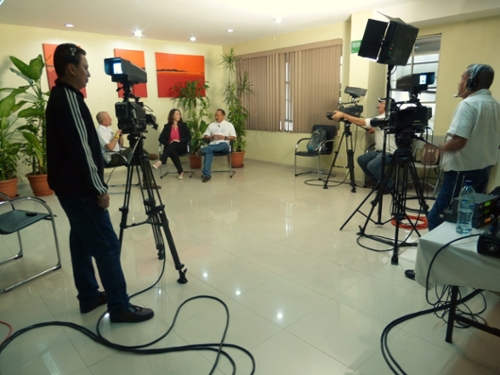San Isidro, El Salvador
PPP Director Stacey Connaughton and PPP Contributor Arunima Krishna recently returned from the PPP's inaugural trip to El Salvador.
Nestled between the rivers Viejo, Titihuapa, and San Isidro, surrounded by majestic volcanic rock hills, lies the municipality of San Isidro, El Salvador. San Isidro, approximately one hour to the east of the capitol San Salvador, is comprised of several small, primarily agricultural villages and communities that cluster around the rivers. The rivers provide drinking water to the communities, are sources of livelihood (for example, fishing) and are the sites of community activities such as family picnics and celebrations. San Isidro and its communities and villages are inextricably tied to the rivers around which they are settled. In a nation where an estimated 97 percent of the water is unsuitable for human consumption, the three rivers, the Titihuapa in particular, remain integral to the communities’ survival.
Unfortunately, the survival of the rivers and the communities is under threat. The volcanic rock hills surrounding San Isidro are quite literally goldmines for multi-national corporations, but fears that gold mining will further wreak havoc upon the already contaminated waters of the three rivers have caused the government to ban mining companies from extracting gold. These fears are not unfounded; in 2008, mining operations polluted the water supply of San Sebastian, a town close to San Isidro, causing the government to take the action. The ban, however, is being contested by a gold mining company in a World Bank tribunal, raising concerns that the ban may be lifted by the court. Furthermore, competing political and monetary interests have left the communities bitterly divided. Brutal murders of water activists have rocked the communities, bringing back memories of the atrocities suffered during the civil war not so long ago, further silencing the communities’ voices.
Since 2001, MUFRAS-32 and its members have worked tirelessly in the area to protect the water sources and address the issue of water contamination. After months of preparation and groundwork, MUFRAS-32 convened a meeting of local and national actors to initiate a community-wide dialogue about this issue. It was this meeting that brought us to San Isidro in June 2016. This meeting was the first of its kind, a reflection of the deep divides in the country generally and specifically around the question of water. 
The meeting, supported by the Purdue Peace Project, was attended by the mayor of San Isidro, representatives of the civil and military police, national level ministry officials, representatives of related national organizations, MUFRAS-32 members, PPP director Stacey Connaughton, PPP contributor Arunima Krishna, along with several community members. It was the first time in years that individuals from various parts of the political spectrum, of various ideologies, and of various positions of power sat together and publicly agreed that the contamination of the rivers was indeed an issue for all to address, and not just for one group or the other. As officials delivered prepared speeches to the community, publicly pledging their commitment to revitalizing and protecting access to the rivers, various community members too declared their support in this endeavor. Community members and officials, who, until the meeting could not be brought to agree on any aspect of the issue, found a forum in the meeting to air their opinions, openly bring out points of disagreement, but finally agree that the onus of action to save their rivers was on them, those most closely affected by the contamination of the rivers. A commission (working group) was established, made up of representatives from various actor groups. They will meet soon to determine next steps. In other words, as with other PPP supported initiatives, this one too will be locally driven. And this initiative could not come soon enough. As Hector Berrios, founder of MUFRAS-32 says, “If the rivers die, the communities die.”
-Author Arunima Krishna is a PPP contributor.


